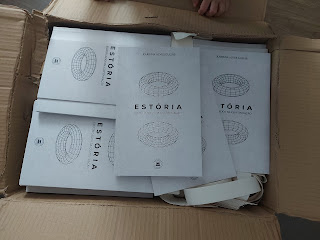28 September 2023
13 September 2023
On the objects of gravity - And the dog
"A monk asked Joshu, a Chinese Zen master:
`Has a dog Buddha-nature or not?'
Joshu answered: `Mu.'" [無 = emptiness, nothingness, 'not']
(excerpt from https://www.ibiblio.org/zen/gateless-gate/1.html)
Taking into consideration the text above, and If we discard any prejudices that may come with the understanding of what religion is and its purpose, we will realise that reading Buddhist literature is one good way to open our minds to a different pathway: the "no concept" stream of consciousness.
It's true that to read the excerpt above from a conceptual and prejudiced perspective will only add to our prejudices, either in regards to the uselessness of religion or the inferiority of dogs or some other stereotypes that may be roaming about our minds. The first impression, however, will always be that of outrage, from a Western point of view.
But what if the way we are reading it is wrong?
If you follow the Buddhist thought process, you will know that we must disregard the emotions that come as a reaction, and try to understand the text we are reading without underestimating what it is trying to provoke on us. In addition, in Buddhism, the path to right understanding will never be that of conceptualization, even though many scholars may try. And, in some way, I am trying here.
Therefore, by first ignoring our prejudices and emotions, we can then open our minds to discard them and consequently try to understand the aforementioned excerpt -- without conceptual thought. And by not conceptualizing the meaning of the words, we will arrive at a different understanding of the text, which is much more all-inclusive than fragmentary.
What I defend here is that the same thought process should be applied to objects and tools. There is a great probability that the way we approach and use tools may be wrong from the start because of our biases, dogmas, and prejudices. When we use them, we are deciding their results, in a way. And they will never truly show themselves to us beyond what we are inclined to see, which is, in most cases, fragmentation.
In a possible field of new physics, this change in approach may be what is missing for us to start translating things in a more all-inclusive way.
Karinna Alves Gulias
11 September 2023
On the objects of gravity - And new physics
No evidence. No paradigmatic truth is ever found or stable. That is what resonates on the clouds of information.
Translating languages or gestures is like translating universe(s). Every misreading, misunderstanding, and that strange feeling of nostalgia in every transliteration are ever present, past, or future in communication. Growing or ingrowing.
To understand the outworld without even acknowledging the universe within every tongue or person. Should we already know that trying to move forward is the same as moving backward?
How can we transcend our cubic limitations if we still attach ourselves vehemently to ideas? Any idea, but especially those that, even though at the present civilization's paradigmatic circumstances should have perished, still persist and are the most obtuse and arbitrary ones: the ones based on value, rank, or merit, like race, gender, or nationality, for example.
"No concept" is where lies the beginning of our true understanding of "travel" and our interplanetary experience, even though it may sound like a fetish. Therefore, transcending our prejudices and barriers is necessary, so that we can enter the age of new science and thus overcome science as a dogma. But first, we need to acknowledge that "tools" are not at our service—something we should have known by now.
Tools, like us, are objects of gravity.
Karinna A. Gulias
Subscribe to:
Posts (Atom)


